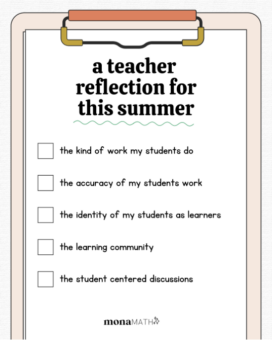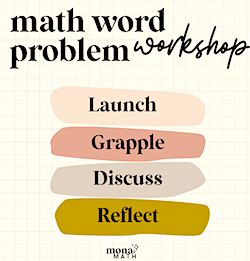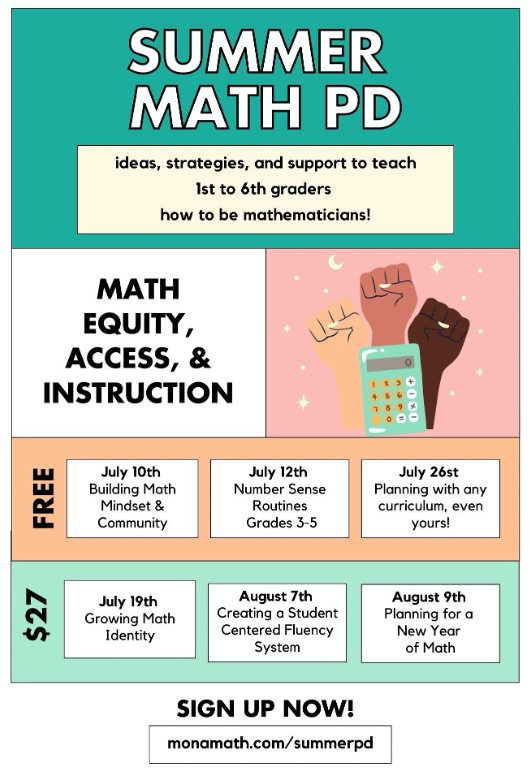Make This Your Summer to Reflect and Envision!
By Mona Iehl

As we end the school year, we inevitably start planning for the next year. What we will try differently? What new system do we want to implement?
We know we cannot change everything, all at once. Instead, we have to choose to do a few things differently each year.
Maybe you’re ready to make some shifts in your teaching practice. Your decision making and instructional knowledge is the most important resource, so it is worth reflecting on all you’ve learned and know and getting a clear vision for your future school year.
When you are refreshed, motivated, and passionate, you’re even more effective. So with that being said, as you go into summer, prioritizing you is critical. I suggest you spend some time reflecting on how this school year went and then consider which few shifts you’ll make next year.
Up to this point, I hope every teacher across the content areas who has taken the time to read this will find some value in my case for reflecting and envisioning. From here forward, I’m going to shift most of my focus to the math classroom – my specialty. That said, some of these processes have broad application.
Let’s frame our reflections as “What’s working?” and “What can we change?”
What’s working in math class?
Your students do their work.
Cue the confetti!! To get middle graders to complete work is a tremendous feat! You must have created a culture where students see the value in the work they are doing. As you reflect on the work students are completing, ask yourself:
✦ What kind of work is it?
✦ What is the depth of knowledge students are being asked to reach?
✦ What could be gained if students had time to discuss those deeper knowledge questions?
Students get most of their work correct.

But before we jump to giving students harder work or assuming they are ready to move on, we should reflect on the independent practice routines in the classroom.
✦ How do you know students are getting their work mostly correct? Are you grading or checking all their work?
✦ Are students not only getting the answers correct, but also explaining their thinking? In what way are they explaining their thinking?
✦ What feedback are you giving students on their work?
My students see themselves as mathematicians.
This is the ultimate goal: that students take on the identity of a mathematician. We want our students to see that being a reader, writer, scientist, mathematician, historian, business person, etc. are all parts of who they are and working toward in school because in life they need all of these related skills to position themselves to be successful.
Staying aware of each student’s math mindset, confidence and self-efficacy is essential to helping them grow.
✦ How do students define success as a mathematician?
✦ What does being a mathematician mean to them? Does your class have a common definition? Does your school have a definition?
✦ What happens to students’ mindsets when they struggle?
Now that we’ve spent time reflecting on what’s working, let’s think about what needs to change next year. Let’s take some time to examine common pitfalls while we maintain an attitude of “looking before we leap” so we don’t get overwhelmed.
I often see this happen when teachers jump into too much, too fast. You know that feeling after you’ve read a great book or attended some inspiring professional development? That feeling of wanting to try it all and make it all happen immediately? Unfortunately it often leads to overwhelm and eventually the loss of direction and energy toward that new idea.
What can we change?
1. Avoid cutting the community-building time short. Spending just a few days community building – going over norms, getting to know each other and building trust – isn’t enough time. If we want our students to take risks and productively struggle, we must ensure that the classroom community is strong. Norms need to be practiced in scenarios that are less risky at first. (See my article here.)
For example, using a Which One Doesn’t Belong activity with pictures and then with snippets of content from last year’s standards is a great way to teach students how to participate in a discussion by sharing their ideas and adding on the thoughts of others or even disagreeing respectfully.
2. Cut back on the teacher talking too much. No matter what shifts you’re making in your practice, it is essential to let the learner talk. As the saying goes, “Whoever is doing the talking is doing the learning.” No matter the resource or instructional strategy, student discussion is a must in order for kids to fully understand the content. This goes beyond answering questions orally – it includes sharing their ideas and responding to the reasoning of others. Always build in time to debrief the activity to help students consolidate their understanding.

3. Stay away from exhausting yourself with planning. So you’re ready to implement something new? That will likely come with added planning and preparation. Summer is a great time to take on the added planning that a new initiative will require because you have the time and energy.
However, I caution you about planning too much. I’ve heard horror stories from friends who have planned a full year of activities only to have the plan be unusable because their grade level changed at the last minute. So proceed with caution and intentionality as you use your summer to do some flexible planning for next year on the fundamentals that apply across grades.
Looking Ahead
Community building, facilitating student discussions and planning are all things I’m confident you value and want to continuously improve. If you have the time and capacity this summer, I’m hosting free professional development that covers those topics. You can find the information at monamath.com/summerpd
As you end the school year and enter into this phase of relaxing while simultaneously planning for next year, remember to take time to reflect and envision before you take action. Asking yourself questions and spending some time wondering can help you set intentions and a vision for next school year that will leave you feeling productive and fulfilled.
In the end, you are your greatest resource. Invest in yourself this summer so you can nurture your students next year.
Mona Iehl (@HelloMonaMath) is a fifth- and sixth-grade math teacher in Chicago, Illinois. Mona started her 14-year year teaching career in the primary grades but found her home in the middle grades six years ago. For more details about her teaching methods, visit her website and see her other MiddleWeb posts here.
Mona recently took her passion for helping teachers and students find their inner mathematician to a podcast. Listen in at @HonestMathChat. More fluency resources for multiplication & division systems are available at her Mona Math TPT shop.































